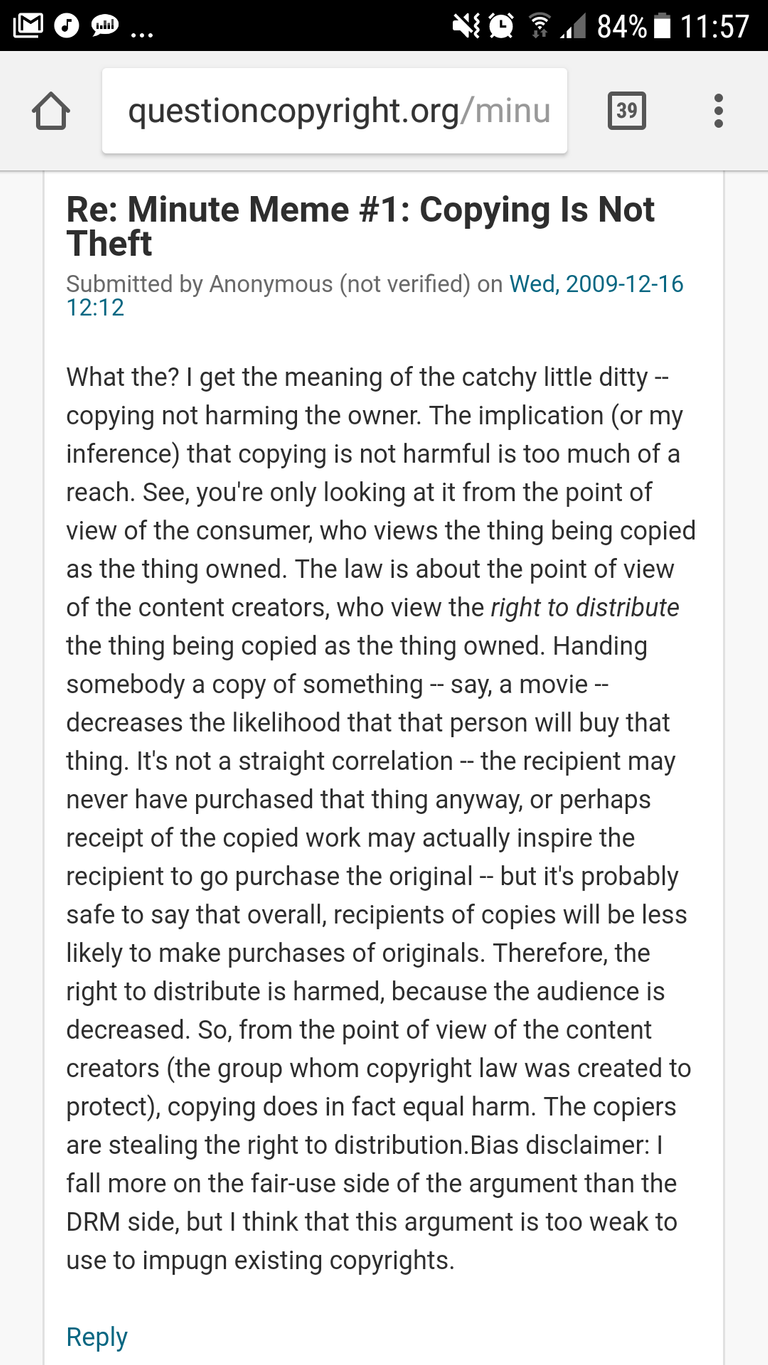Copying Is Not Theft
8 years ago in #dmania by inertia (74)
$41.73
- Past Payouts $41.73
- - Author $32.82
- - Curators & beneficiaries $8.91
- > dmania: $2.09
- > freedom: $1.04
- > lafona-miner: $1.04
- > northeast: $1.04
86 votes
- matt-a: $20.67
- inertia: $12.62
- webdeals: $1.19
- whatsup: $1.10
- vi1son: $1.03
- pitterpatter: $0.98
- zombee: $0.55
- crowdfundedwhale: $0.47
- personz: $0.37
- seablue: $0.28
- makishart: $0.25
- estonia: $0.23
- spbesner: $0.22
- runridefly: $0.17
- dez1337: $0.17
- arrowj: $0.15
- luigi-tecnologo: $0.13
- jamesallen: $0.12
- nettybot: $0.11
- beet: $0.08
- and 66 more


Nothing !!!!People assume the statement "Copying is not theft" is akin to saying: "Copying is not wrong".
What they refuse to see or admit is that theft and copyright infringement are different things - the copyright-maximalist propaganda has done its job well.
It's all rather sad, really... that people have come to assume that copying is somehow as bad (or worse?) than stealing. It's almost incomprehensible that we've reached this point.
Exactly. It's similar to the propaganda of "draining the reward pool." That only happened once on the STEEM blockchain. They drained it so they could fill a much bigger pool.
Similar to how "copying is theft" gets their point across about how they disapprove of copying, "draining the reward pool" means they disapprove of how rewards are allocated. They want to use a means other than stake alone. They want some kind of influence cap instead of or in addition to the stake-based system we have.
duplicating not hurting the proprietor. The proposition (or my acknowledgment) that duplicating isn't harming is excessively of a cross. It couldn't be any more undeniable, you're basically looking from the perspective of the buyer, who sees the thing being copied as the thing had. The law is about the perspective of the substance makers, who see the advantage to disseminate the thing being duplicated as the thing had. Giving some individual a duplicate of something - say, a film - diminishes the probability that that individual will purchase that thing. It's not a straight affiliation - the beneficiary may never have gained that thing at any rate, or maybe receipt of the repeated work may really goad the beneficiary to go buy the first - yet it's most likely guaranteed to express that when all is said in done, beneficiaries of duplicates will be less arranged to make buys of firsts. Thusly, the advantage to diffuse is hurt, in light of the way that the social event of onlookers is diminished. Subsequently, from the perspective of the substance makers (the party whom copyright law was made to secure), mirroring does as a general rule square with hurt. The copiers are taking the advantage to distribution.Bias disclaimer: I fall more on the sensible utilize side of the question than the DRM side, yet I instigate that this contention is extremely frail, making it hard to use to upbraid existing copyrights.
But so does renting. Content producers often initially fight emergent rental markets because they think it will adversely affect their bottom line. But when they allow it, they find a happy equilibrium instead of the dooms day they predict.
Yeah just like you copied the comment from another place :D

Copying is not theft. Stealing a thing leaves one less left Copying it makes one thing more; that's what copying's for. Copying is not theft. If I copy yours you have it too One for me and one for you That's what copies can do If I steal your bicycle you have to take the bus, but if I just copy it there's one for each of us! Making more of a thing, that is what we call "copying" Sharing ideas with everyone That's why copying is FUN!
I see what you did there.
There are those who say that copying theft, Hua does not believe in the exchange of ideas
I have this cd player that was made in the USA by escient, inside it has a hard drive, and you can burn your original cd, onto the hard drive, and play it without having to put the cd in it, in the UK this infringes on copyright, and you can be fined or imprisoned for it, yet they still sold this machine in the UK, it also has the capability to burn the songs onto another disc, so you can preserve the original in new condition, this is also against the law, figure that one out.
If that was the standard, content producers could sell box sets, at a much higher markup, knowing that people would always rip them before playing. They'd know that friends would rip other friend's CDs. And sometimes those friends would buy the media when they lose their entire albums due to damaged players, et c. It would be glorious.
It is glorious, I bought this one second hand, and it was full of Pink Floyd & roger waters albums, plus hundreds more, 180gb worth, I also moved from the UK to Poland & Poland has no such draconian laws as the UK, happy days here my friend. (edited) Wow, I earned more for 1 comment to you, than I have on any single post I have made to date, Thank you.
I am in a battle to know what is right and wrong as an rtist, I just came back from a serious illness and used borrowed 3 year old zines for an exersise and to help other artist. I got misundstood comment by a friend and shunned from payment . . . making me not want to do borrowed library works. My work is all CREATIVE COMMONS . . . it's something to think about what and how we belive. 100% upvote from me and I'm putting on dtube in hope more see it.
So if I read a nice story on the internet and I want to share it by copying it and past it on steemit am I allowed to do that?
If you cite your source, usually it’s allowed.
Ok cool thanks for the help
owo nc bro
Last week, the New York Times ran an interesting and important op-ed by Stuart Green, a law professor, who argues that although illegal downloading of songs or videos from the Internet may be wrong, it’s not really “theft” in the sense that the term has been understood historically in the law. Nor is it theft according to the moral intuitions of ordinary people (as Green’s own research with psychologist Matthew Kugler shows), who draw a sharp distinction between online file sharing and ordinary theft, even when the economic value of the property taken is the same. That’s not to say that record companies and movie studios are not hurt by online piracy. But as Green points out, they’re really not hurt in the same way that victims of theft typically are. If a thief steals your car, he has it, and you don’t. But if someone illegally downloads your song, he has it — but so do you. onomic terms, intellectual property is non-rival, whereas tangible property is rival. As a result, the “piracy” of intellectual property is simply not the same sort of zero-sum game that car theft — or theft of any tangible property — is. And that means that when Hollywood or the U.S. government says that music or movie downloaders are “pirates” or “thieves,” they are indulging in a bit of loose rhetoric. There are, in general, good moral reasons not to take what doesn’t belong to you. But as this video by filmmaker Nina Paley so beautifully illustrates, copying is not theft.
Thanks for sharing the video
Yeah, copying is not theft Untill you're caught 😂
Good moral reasons not to take what doesn’t belong to you. And there you go implying that copying is theft. because when you consider that intellectual property is not property, It's no longer something that can belong to you, nor be taken. Ideas are not property. Intellectual Property is better described as Intellectual Monopolies.
Yeah I don't get it why copying is considered bad. You don't steal anything at all. You just make a copy of something but the original data is still in its place.
Copying doesn't do any harm, because cuz you don't steal the orignal.
Theft is different from copying. Like with the bike in the video. If you take away the bike, it's theft, but if you copy the bike, there's a bike for each of them...
This is wrong.
As a business owner and individual that produces and makes a living off intellectual property such as books and videos, copying takes money from my family and business. A comment above stated it well copying does not hurt the consumer (although if they are aware, it hurts their integrity), it hurts the producer.
If done enough the incentive to produce new information or product diminishes and therefore all suffer.
I guess it entirely depends on the person. For example, if I couldn't listen to music for free, I would still never buy it. If I couldn't watch movies for free, I still wouldn't buy them. I value real things more than digital products, thus it wouldn't make much difference for me if I could copy them or not...
That is false. The only point being made is that copying is not theft. Unauthorized copying can harm. It's just not theft.
I agree with you for few minutes. 'The copy that is not theft' Then we can not deny technology. Because here it is greatly mentioned that the copyright will be captured when copying. So, what do we believe your content or technology?
The truth of the matter is, numerous individuals do comprehend the message and appear to value it, yet I'm to some degree amazed at the individuals who can't help contradicting it who want to not simply deviate, but rather to go about as though only expressing a four word accurate sentence is by one means or another hostile. It began in our remarks where somebody demanded that expression replicating isn't burglary wasn't simply wrong, yet was "uninformed and unreliable." Huh.
You are right! Copying is not theft.
I think it is difficult to defend "copying" someone else's work without using some fairly iffy logic. For instance, making an argument about renting being similar is not justification for the act. Meh, maybe I am wrong. I have copied other people's "intellectual property" before. Sometimes I feel bad. Sometimes I do not. I make a copy of The Three Stooges shorts, and I do not feel bad. They are dead and cannot profit from their work any longer. I make a copy of Star Trek, and I am potentially dipping my hands into the pocket of the creators (studio, actors, writers, etc.). I make a copy of a reality TV show, and I am an idiot.
I like your posts
Good post
Thnkyou for posting a good image
i have followed you, follow me too please :)
Say no to pirated articles
hahhaha... I Still Laugh